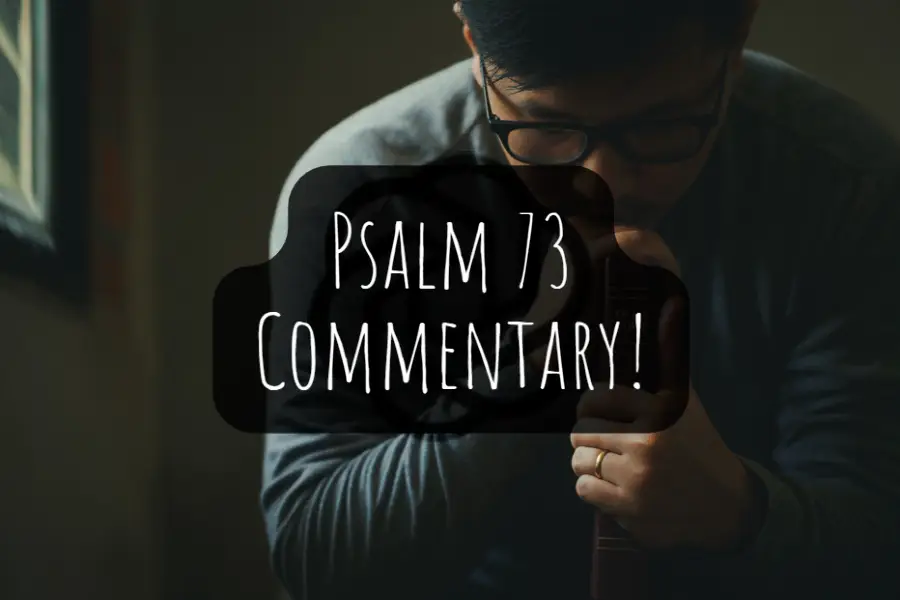Psalm 73 Commentary: The Tragedy of the Wicked, and the Blessedness of Trust in God
Welcome to our Psalm 73 Commentary, titled the tragedy of the wicked and the blessedness of trust in God. This Psalm encapsulates a journey of faith, a struggle with envy, and the profound realization of divine reality.
Written by Asaph, a prominent figure in the Hebrew scriptures, the Psalm offers an emotional recounting of his internal struggle with envy towards the prosperity of the wicked, before eventually realizing the transient nature of their prosperity compared to the eternal bliss reserved for the faithful.
See also: Psalm 27 Commentary – Faith and Confidence In God
Understanding the Psalmist Asaph
Asaph was a Levite appointed by King David as the leader of sacred worship, in charge of singing and making music at the tabernacle. A man of deep spiritual understanding, Asaph penned twelve psalms (50, 73-83) – his writings often reflect a broad understanding of Israel’s history and destiny. You can further read about Asaph’s life and work here.
His contribution to the Book of Psalms provides an intimate look into his personal spiritual journey, with Psalm 73 standing out for its raw emotional honesty and deep theological insights.
Psalm 73 Commentary: Verse-by-Verse Analysis
Psalm 73:1-14: The Psalmist’s Envy of the Wicked
Asaph opens with the affirmation of God’s goodness but quickly shares his doubts and struggles with the perceived prosperity of the wicked. He details their apparent ease of life, arrogance, and violence, questioning why they seem to prosper despite their defiance of God.
Psalm 73:15-22: The Psalmist’s Struggle and Enlightening
In these verses, Asaph’s tone changes. He realizes that voicing his doubts would have betrayed God’s children. Entering the sanctuary of God, he gains divine insight into the ultimate fate of the wicked – sudden destruction. This realization changes his perspective, leading him to confess his ignorance and brutishness.
Psalm 73: The Psalmist’s Affirmation of God’s Goodness
Asaph concludes the psalm with a renewed faith in God. Despite his initial struggle, he ends by affirming God’s constant presence and guidance. Asaph concludes by extolling the virtues of placing his trust in God, realizing that earthly desires are fleeting, and God’s presence is all he needs. He commits to staying near God, making Him his refuge, and sharing all His works. You can find the full Psalm 73 text here.
Themes in Psalm 73
- The Righteous Versus the Wicked: This Psalm contrasts the ultimate fate of the wicked with the reward of the righteous, challenging the common misconception that prosperity is a sign of divine favor.
- Human Doubt and Divine Reality: Asaph’s struggle and eventual enlightenment showcase how human perspectives can be limited and skewed, emphasizing the need for divine wisdom to understand life’s realities.
- Faithfulness and God’s Sovereignty: Despite his doubts, Asaph’s faith leads him to understand God’s sovereignty and justice, ultimately accepting God as his strength and portion.
Practical Applications of Psalm 73
- Lessons on Envy and Contentment: This Psalm teaches us to resist envy of the seemingly prosperous wicked and find contentment in God’s presence and promises.
- Understanding God’s Divine Justice: Psalm 73 helps us to understand that God’s justice may not always align with human expectations. The wicked may prosper for a time, but their end is destruction.
- Embracing God as the Strength of Our Heart: Asaph’s declaration of God being the strength of his heart encourages us to lean on God in times of doubt and struggle, understanding that He is our ultimate refuge.
FAQs About Psalm 73 Commentary

Why does the Psalmist envy the wicked in Psalm 73?
Asaph envies the wicked because he observes their prosperity and perceives that they are free from common human burdens, causing him to question the value of living a righteous life.
How does Psalm 73 address the problem of evil?
Psalm 73 tackles the problem of evil by emphasizing the ultimate divine justice. While the wicked may prosper in this life, their end is destruction, contrary to the eternal good reserved for the righteous.
What does Psalm 73 teach about God’s sovereignty?
Psalm 73 underscores God’s sovereignty, demonstrating that despite human understanding or circumstances, God is in control and His justice prevails.
How can Psalm 73 be applied in our daily lives?
Psalm 73 can be a reminder to avoid envy, to seek understanding through a divine perspective, to trust in God’s justice, and to find contentment and strength in God’s presence.
Final Thoughts
Through Asaph’s heartfelt confessions in Psalm 73, we journey from questioning God’s justice to affirming His sovereignty and goodness. This psalm serves as a reminder that earthly prosperity is temporary and fleeting. It prompts us to focus on eternal realities, trust in God’s ultimate justice, and find solace in His unending presence. Thus, Psalm 73 provides invaluable life lessons on faith, envy, divine justice, and contentment, guiding us towards a deeper understanding of our relationship with God.






